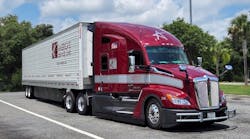The good news, in the view of the analysts at FTR Associates, is that the freight market is starting to stabilize and has stopped contracting. The bad news, however, is that there are no signs of the economic growth needed to fuel a revival of the freight markets in the near future.
“We’re getting stability in freight volumes and the shrinkage in the [freight] market has stopped – that’s a good thing, particularly for trucking,” Noel Perry, a senior consultant with FTR and principle of research firm Transport Fundamentals, told reporters in a conference call.
“Stable freight will allow trucking networks to get more efficient,” he explained. “But for freight volumes to grow, the U.S. economy needs to grow by 3% or more – and no growth like that is foreseeable for at least the next six months.”
Perry added that excess capacity remains the Achilles heel of the trucking industry right now, with 300,000 trucks currently either parked or under-utilized. With so much over-capacity still in the market, he said the opportunity for strong pricing might not occur until 2011, based on the overall pace of economic recovery currently projected for the U.S.
That’s putting a major damper on the outlook for truck and trailer sales, according to Eric Starks, FTR’s president. “The disconnect is that despite a more optimistic view of the economy, that still hasn’t changed the dynamic of the over-capacity situation,” he said. “[Trucking] must still work off that capacity in the near term.”
Starks noted that FTR is seeing heavy orders of Class 8 engine components by truck manufacturers, indicating to the firm that 2007-grade engine technology is going to be placed into new Class 8 trucks a lot longer than initially expected, delaying the changeover to 2010 engine technology. “Will we see a delay in that changeover into the second quarter? Or even into the third quarter? That is the million-dollar question,” said Starks.
FTR is projecting annual Class 8 sales of 105,000 units in 2009, rising to 133,000 in 2010 and 198,000 by 2012. Trailer production is expected to stay flat in 2010, returning to more “normalized” levels between 2012 and 2013. “Not much is happening in the trailer market to either cause anxiety or to cheer about,” he noted.
The medium-duty truck market is what concerns FTR the most. “The Class 4-7 segment is taking the greatest hit; we’re pulling down our production forecast by 22,000 units in 2010 and 15,000 in 2011,” Starks noted. As a result, the Class 4-7 sales rate should reach only 92,000 units in 2009, climbing to 115,000 in 2010 and 171,000 in 2011, FTR predicts. “That 171,000 unit level in 2011 only brings us back to the recessionary sales level of 2003,” Starks pointed out. “That’s why we have significant concerns about this market segment for the next several years.”
Still, in the view of Bill Witte, economist and co-director of the Center for Econometric Model Research, the U.S. economy has turned a corner, which is good news at least in the short term.
“We’re more optimistic now, particularly about the third quarter, than we were three months ago,” he said at the briefing. “While the economic recovery is not particularly impressive at this stage, the negative 1% drop in economic growth in the second quarter was a lot better than the negative 2% we expected. Our expectation now for the third quarter is for the economy to grow a little above 2%.”
Longer term, however, things get dicer for the U.S. economy, creating more uncertainty for truckers. “While things are looking better, this is not a robust recovery,” Witte explained. “The economy should accelerate out into the middle of 2010, then slow down. Farther out into 2010 and 2011, the economic growth numbers get subdued.”
Witte said the “little grain of salt” in the U.S. economic recovery is that job growth is unlikely in 2010. “The labor market is going to lag behind by a couple of quarters,” he noted. “Unemployment probably won’t reach 10% overall in the U.S. but it’s still not going to be a good labor market for the next several years.”
The bigger concern long term is inflation, said Witte. “The Federal Reserve has supported the economy in an unprecedented way to date, pumping in huge amounts of liquidity” into the financial markets, he explained. “Farther out, if we don’t remove that liquidity, inflation is the worry, but removing that liquidity will be a very tricky operation.”
Large and ongoing federal government deficits are adding to the problem, noted Witte. “It’s a huge concern, for by 2012 and beyond the deficits will really reach unsustainable levels. How do we resolve them? That is the $6.4 trillion question – but it is a real concern here.”




